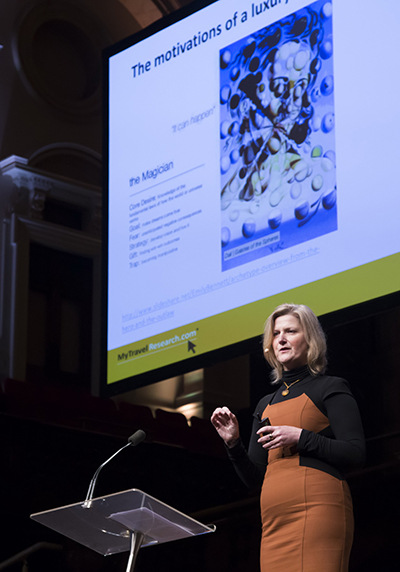Wealth inequality changes luxury travel finds MyTravelResearch
INCREASING inequality in wealth is one of the factors changing the nature of luxury travel, according to MyTravelResearch.com co-founder and luxury travel expert, Carolyn Childs.
Ms Childs told a seminar at the recent Luxexperience exhibition in Sydney that social and political forces such as the Occupy Movement and government austerity cuts were driving many wealthy people to spend more privately.
She said a counterpoint was that the same forces had also encouraged the rise in socially responsible luxury travel activities. 
“The trend to private consumption away from public scrutiny can be seen in the increase in purchases of mega yachts and private islands,” Ms Childs said. “Technological change and its impact on workplace communications has also triggered a counter demand among the rich to de-tech completely while on holiday.”
Ms Childs told the audience of 500 high-end travel buyers, sellers and advisors at the Luxperience Thought Leaders seminar that the international Occupy movement – which grew out of the Occupy Wall Street event – like the French and Russian Revolutions before it, had changed the psyche, moral reference points and consumption patterns of well-off people.
“We now see the rise of responsible resorts such as El Nido in the Philippines where high end travellers are both pampered and give back to the community,” Ms Childs said.
“Luxury travel is now increasingly defined by a rising commitment to people, planet and self-improvement as much as indulgence, pampering and conspicuous consumption.”
Ms Childs told the audience that wealth disparity has been on the rise since around 1980, with the richest 1-10 percent in North America, Europe and Australia now owning over 70 percent of society’s wealth.
Ms Childs observed that the rise in the nouveau riche, particularly in China, India and the G7 economies, has seen luxury consumers around the world splinter into personality types such as philanthropist, dynast, lotus eater, hedonist, pioneer, jet setter, enrichment seeker and replenisher.
Ms Childs said the luxury travel sector had also seen the rise of “aspirational consumers who will splash the cash” depending on three factors: the occasion, such as a honeymoon or anniversary; the experience, such as a trip to Antarctica; and the traveller’s ability to trade up or down – for example, enjoying a three-star holiday but taking a helicopter ride to a spectacular dinner on the last day.
One key aspect of modern luxury travel came embarrassingly to the fore in Australia with the events surrounding the unauthorised importation of two dogs by Hollywood movie star Johnny Depp staying on the Gold Coast while filming the latest instalment of Pirates of the Caribbean.
Ms Childs said luxury travellers now relied on elite travel agents, or advisors, that she called “magicians”.
“These Gandalfs and Merlins are completely service-minded, very creative control freaks who try to anticipate the psychological and physical needs of their clients,” Ms Childs said.
“They have to deliver magic. They dread saying ‘no’ to a customer who is only used to hearing ‘yes’.
“When it goes wrong the results can be high profile,” she said, citing Mr Depp’s terriers Pistol and Boo, who faced being put down when the actor brought them into Australia in defiance of quarantine regulations.
In December, Ms Childs will publish an in-depth study of trends and changes in the luxury travel economy in partnership with Luxperience
ends

 How to resolve AdBlock issue?
How to resolve AdBlock issue?